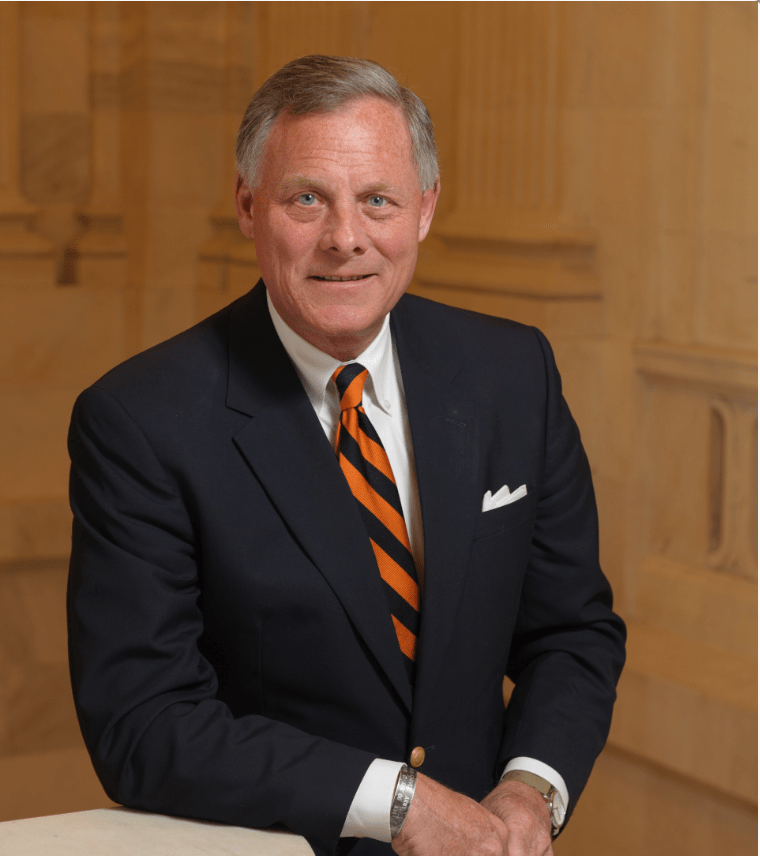U.S. Senator Richard Burr suggested the Senate intelligence committee he chairs has looked “more extensively” into allegations of collusion between the Trump campaign and Russian than special counsel Robert Mueller.
The third-term senator made those remarks last night in a lecture at Duke that covered everything from immigration and guns to the New Green Deal and geopolitics. Burr was the first North Carolina senator to deliver the Terry Sanford Distinguished Lecture. (Burr holds the same Senate seat as former governor Terry Sanford, for whom Duke’s Sanford School of Public Policy is named.)

As part of the talk—titled, “Reflections on a Quarter Century in Congress and the Future of Politics in the 21st Century”—Burr was interview by Deondra Rose, a Duke assistant professor of public policy and political science.
Rose opened by asking about “the thing everyone wants to know about”: Mueller’s investigation and the Senate intelligence committee’s own investigations into Russian interference in the 2016 election and possible coordination between Russia and the Trump campaign.
Burr responded that both inquiries have found that Russia did interfere in the election, and neither found evidence of collusion. Burr said he believes the intelligence committee had looked at possible ties between the Trump campaign and Russia “more extensively” than Mueller, whose full report has not yet been released but rather summarized in a four-page letter from Attorney General William Barr. Burr said he hasn’t read the Mueller report, but his committee did refer matters in which it suspected criminality to the special counsel and other investigators.
“We’re not finished with our investigation,” he said. “We’ve interviewed over two hundred people. We’ve got over forty thousand pages of interview notes. We’ve got five hundred and forty thousand documents. We have looked more exhaustively than, I think, the special counsel at those things dealing with the Trump campaign and Russia, specifically because ours is a security and intelligence mandate. It’s not a criminal mandate.”
Burr said that, in 2016, Russia tried “to create societal chaos around the election” by manipulating sites like Facebook, Twitter, YouTube, and Google to highlight existing divides in America—and did so with less than $100,000. Its efforts were then magnified by the media.
“The thing we need to get through the media’s skulls and to the American people is that this wasn’t really about an election,” he said. “This was about a 1960s Soviet mentality that what’s bad for America is good for them, and they used twenty-first-century tools to do it, and they used our own First Amendment protection to hide behind it.”
Burr said it’s difficult to legislate against what Russia was able to do without running into First Amendment violations, which means the government needs to work collaboratively with those platforms.
Asked about the threat of white nationalism, Burr again talked about the role of the media in driving issues “to where they become volcanic, almost.” He didn’t directly address white nationalist violence.
He also said that America’s biggest geopolitical foe depends on the day.
“Russia is a huge concern,” he said. “On any given day, North Korea might be in front of that. On any given day, Iran might be in front of that. On any given day, China might be in front of that.”
In particular, he highlighted the threat of Chinese intellectual property theft and said he expects the number of visa for Chinese students to attend American universities, including Duke and UNC, to go down as a result.
Much of the conversation was spent on immigration. Burr said his legal counsel had determined that President Trump had the authority to declare a national emergency at the southern border, but he doesn’t necessarily agree it should have been done. (Even so, he voted in support of the president’s national emergency declaration when the matter came before the Senate.) He said people should be able to legally immigrate to the U.S. in a way that’s easy to navigate and cost-effective.
“You can’t look at the numbers of people who are attempting to cross and the challenges we have from the standpoint of detention or medical needs at the border and say there’s not a crisis,” he said. “There is a huge crisis. It’s bigger than anything I’ve seen in the twenty-five years I have served, but it doesn’t address what I think most Americans want. They want us to fix our legal immigration process.”
Burr didn’t delve into his thoughts on what had caused that crisis, other than to say the current system incentivizes family to send their children ahead to the U.S. as unaccompanied minors.
Burr said he would “love to debate” the Green New Deal, a green energy and jobs platform, but he didn’t think the proposal was filled in enough.
“I don’t want to set a goal technology can’t get to,” said Burr, who in 2017 voted for a tax cut bill that benefited the rich and has exploded the deficit. “The Green New Deal to me—without looking at the specifics—it’s a pipe dream. It is a policy statement.”


